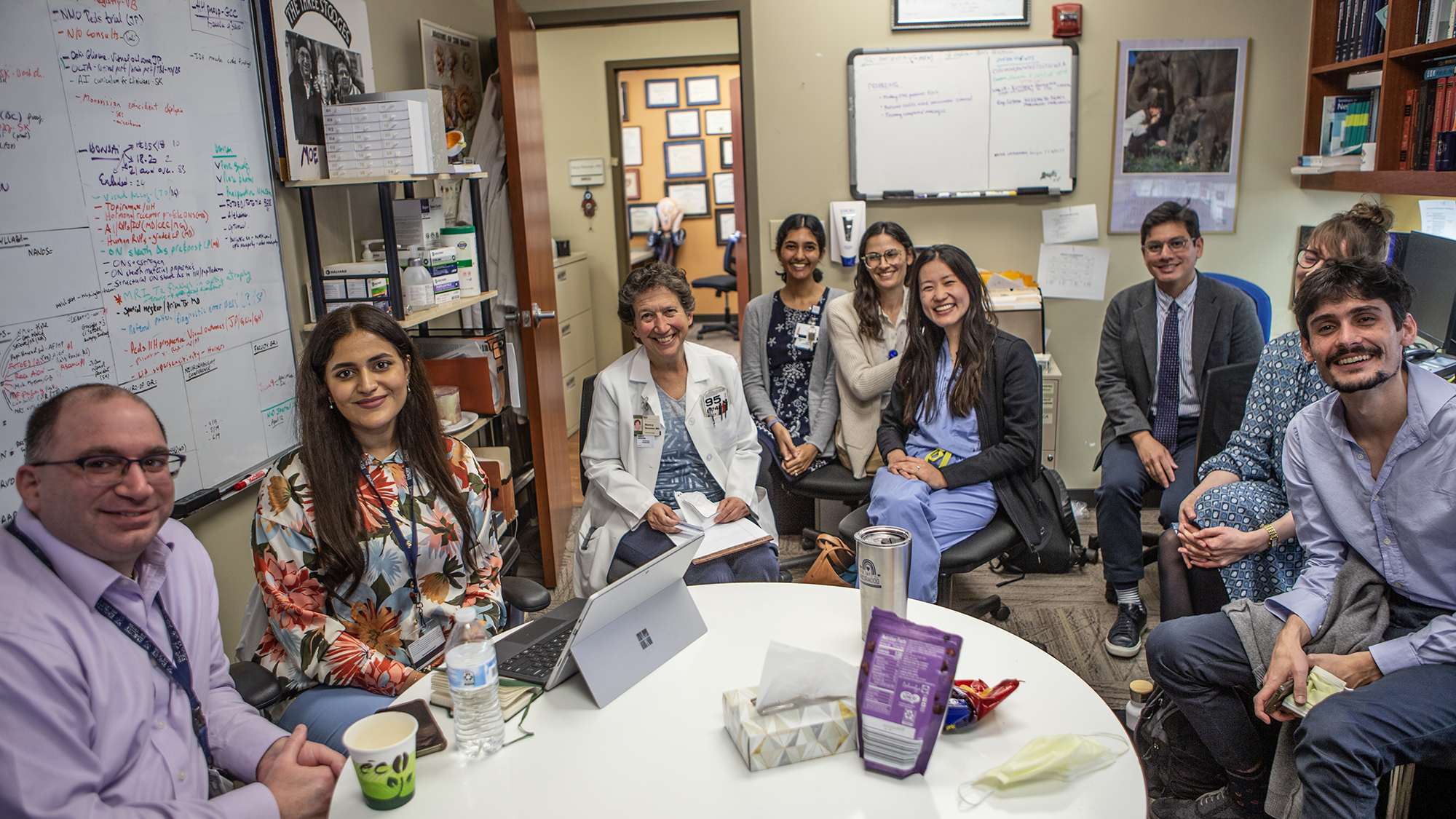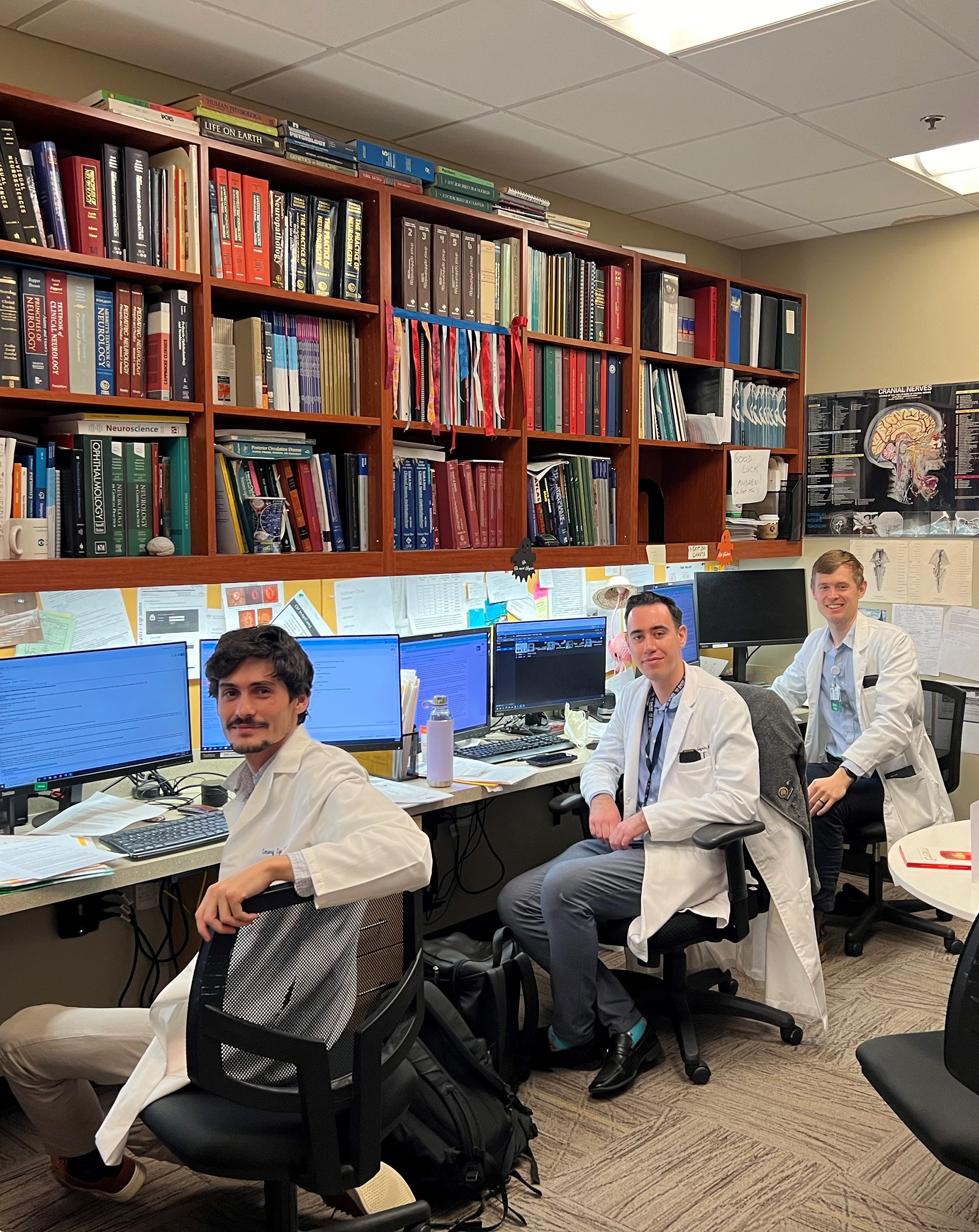
Extensive clinical experience
Fellows accepted into the neuro-ophthalmology service join a very busy, focused clinical team. The first two months of the fellowship are full clinical immersion, where fellows will evaluate patients with a large variety of neuro-ophthalmologic problems and provide second opinions for cases referred primarily by ophthalmology, neurology, neurosurgery, interventional radiology, rehabilitation, and oncology. Clinics are staffed by at least one attending physician.
Most neuro-ophthalmological fellows will work on the Clifton Campus, but some may occasionally see patients at Grady Memorial Hospital.
On a daily basis, neuro-ophthalmic fellows can anticipate the following clinical workflow:
- All medical records are reviewed the day before clinic by fellows and residents
- One fellow or resident sees the patient first
- If necessary, visual field testing and ocular imaging are performed
- The fellow or resident will discuss the findings and plan with attending
- The attending will review all findings (including ocular and brain imaging studies) and discuss with patient with trainees present
- After clinic: the fellows collect best images for teaching and reviews findings with residents and students; these images are often used to create submissions to the EEC-NOVEL library.
Neuro-ophthalmological fellows are expected to choose and pursue a research topic that will be presented and published. Each fellow is assigned an Institutional Research Board (IRB)-approved research project prior to the beginning of their fellowship. Within a week of arriving on campus, fellows take the CITI course/test and are then added to the relevant IRB. Data collection and analysis are done during the first few months of the fellowship, so that abstracts can be submitted to NANOS as well as other appropriate professional organizations (AAN, ARVO or AAPOS). Manuscripts are submitted in the spring of the fellowship year.
As employees of Emory Healthcare, all Emory Eye Center fellows receive 20 days of vacation time, standard holidays, and time consideration to attend professional conferences and seminars.
Focus on research
Neuro-ophthalmological fellows are expected to choose and pursue a research topic that will be presented and published. Data collection and analysis are done during the first few months of the fellowship, so that abstracts can be submitted to the NANOS annual meeting as well as to other appropriate professional organizations (AAN, ARVO or AAPOS). Manuscripts are submitted in the spring of the fellowship year. The Neuro-ophthalmology section has numerous publication opportunities available to its fellows.
Emphasis on medical care
This fellowship focuses on medical neuro-ophthalmology but ophthalmology-trained fellows may elect to participate in surgical procedures upon request. Two of the section's neuro-ophthalmology faculty perform strabismus surgery. Training in anterior segment surgery and basic oculoplastic procedures may be possible when there is no scheduled clinic. Neurology-trained fellows are encouraged to observe a few surgical procedures to understand basic surgical techniques.
The Application Process
The Traditional Fellowship
Annually, the neuro-ophthalmology service offers two openings in a classic one-year, funded fellowship program. The next cohort will begin in July of 2026 and run to July of 2027. Those seeking to join the 2025-26 cohort should submit an application through SF Match by August 31, 2025. Selected candidates will then be interviewed in-person at Emory on Friday November 15. Applicants who are unable to travel to Emory may be interviewed virtually in the afternoon of Friday November 15. There will be an optional meet-and-greet with our current fellows in the evening of Thursday November 14.
These fellowships are generally based at the Clifton Road campus and each cohort often includes one neurology-trained physician and one ophthalmology-trained physician, although this varies from year to year.
These AUPO-compliant fellowships are open to US- and Canada-trained ophthalmologists and neurologists. They are also open to internationally-trained ophthalmologists and neurologists who are fluent in English and who have obtained an Educational Commission for Foreign Medical Graduates (ECFMG) certificate. They are paid at the post-graduate year-4 level and include benefits plus support for travel to professional conferences
Applications are made through the standard SF-Match process. For more information, visit Emory Eye Center fellowships or contact the fellowship coordinator, KimberLe' Parker-Taylor
The International Clinical Research Fellowship
The International Clinical Research Fellowship is an unfunded one-year to two-year position open to international ophthalmologists and neurologists who are fluent in English and who do not have ECFMG certificates. All International clinical research fellows are funded by organizations or grants obtained in their respective country prior to the start of the fellowship.
The precise schedule and specific responsibilities of each international fellow will vary based on the fellow's level of training, fluency in English, personal interests, and intended fellowship duration.
Interested applicants should directly contact the fellowship director, Dr. Valérie Biousse. Candidates under consideration will be asked to provide their CV and two letters of recommendation. They will be contacted by the fellowship director for a virtual discussion, at which time the practical aspects of this fellowship will be discussed.


